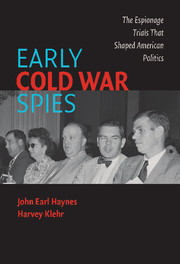Book contents
- Frontmatter
- Contents
- Series Editor's Foreword
- 1 Introduction: Early Cold War Spy Cases
- 2 The Precursors
- 3 Elizabeth Bentley: The Case of the Blond Spy Queen
- 4 The Alger Hiss–Whittaker Chambers Case
- 5 The Atomic Espionage Cases
- 6 Judith Coplon: The Spy Who Got Away with It
- 7 The Soble-Soblen Case: Last of the Early Cold War Spy Trials
- 8 Conclusion: The Decline of the Ideological Spy
- Index
- References
6 - Judith Coplon: The Spy Who Got Away with It
Published online by Cambridge University Press: 05 June 2012
- Frontmatter
- Contents
- Series Editor's Foreword
- 1 Introduction: Early Cold War Spy Cases
- 2 The Precursors
- 3 Elizabeth Bentley: The Case of the Blond Spy Queen
- 4 The Alger Hiss–Whittaker Chambers Case
- 5 The Atomic Espionage Cases
- 6 Judith Coplon: The Spy Who Got Away with It
- 7 The Soble-Soblen Case: Last of the Early Cold War Spy Trials
- 8 Conclusion: The Decline of the Ideological Spy
- Index
- References
Summary
Fbi agents arrested judith coplon in the act of handing over secret government documents to a Soviet intelligence agent yet the intricacies of the American judicial system allowed her to escape justice. Indeed, her case highlights the difficulties American law, designed to deal with ordinary criminality, often has with espionage cases.
The daughter of a small New York toy manufacturer, Judith Coplon did well in high school and enjoyed academic success at Barnard College in New York. As an undergraduate she also participated in student groups aligned with the Communist Party and actively promoted Soviet causes. After graduation in 1943 she got a job with the New York office of the Economic Warfare section of the U.S. Justice Department. (The Economic Warfare section dealt with legal issues arising from American policies to intervene in international trade to insure a supply of strategically important commodities to the United States and its allies and to deny those goods to enemy nations.) A routine personnel security check at the time she was hired noted her undergraduate Communist activities, but personnel security offices were looking for Nazi sympathizers, and in 1943 Coplon's Communist links neither disqualified her nor even earned a flag on her file for future reference in this case. It should be noted that the attitudes of security officials toward Communists varied widely in World War II. There was no uniform policy: some, particularly military security officers, regarded Communist association as prima facie evidence of a security risk while others ignored it.
- Type
- Chapter
- Information
- Early Cold War SpiesThe Espionage Trials that Shaped American Politics, pp. 192 - 207Publisher: Cambridge University PressPrint publication year: 2006

